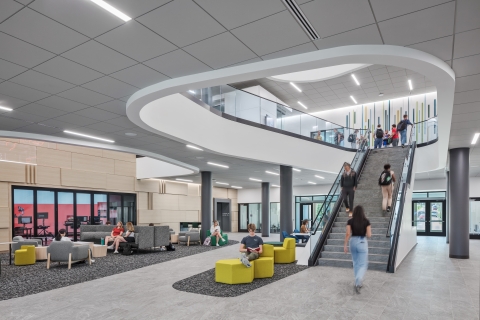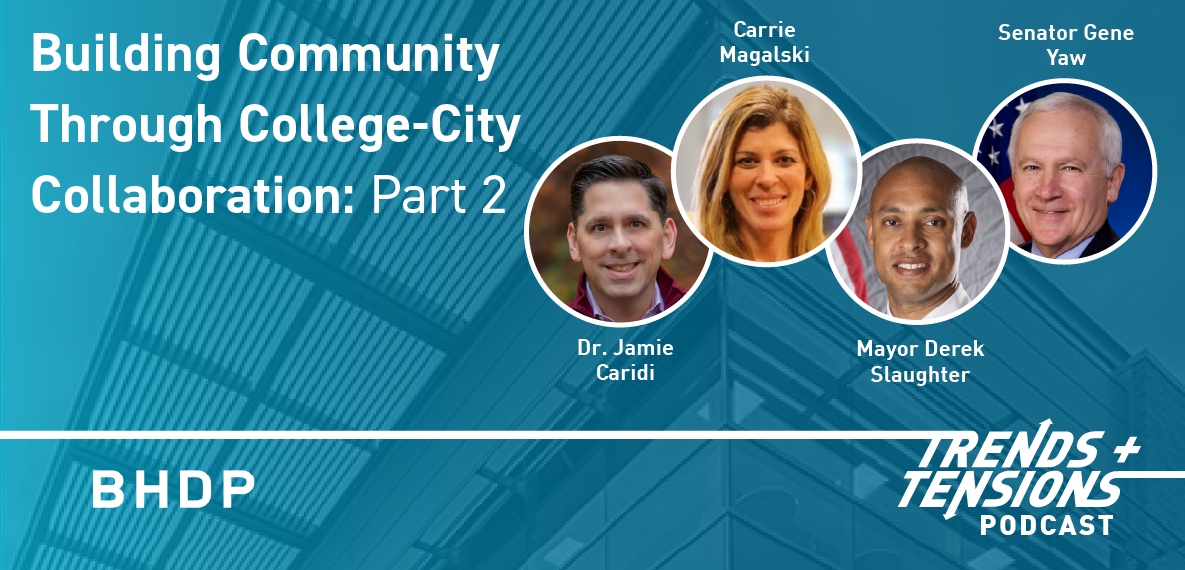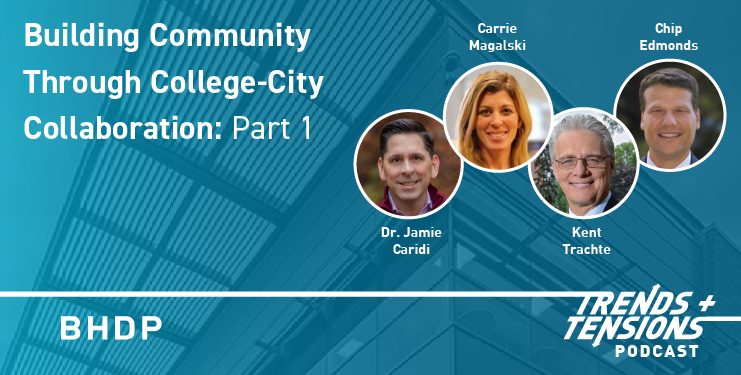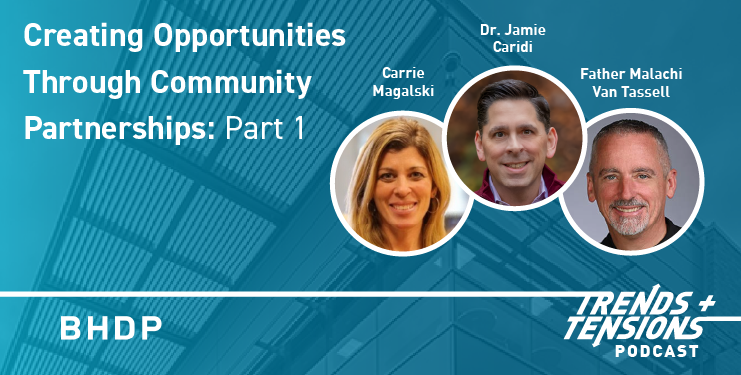
Building Community Through College-City Collaboration: Part 2

Want to listen on another platform? Choose your platform here.
Episode Transcript
[Music Intro]
Brian Trainer, Host:
Carrie Magalski: Senator, we … we've spoken with many of your constituents and with Lycoming College, and they said that you were a great advocate for the project between Lycoming and Old City Williamsport, so we really just wanted to hear your perspective, and what your view is on this project as far as what went into it. And really, what message would you like to convey?
Senator Gene Yaw: I don't mean to be facetious, but it's the right project, at the right time, with the right people. It just so happened that Lycoming College was probably very fortunate, in a way. All these things just kind of came together in a project area which is going to change the character of that neighborhood in that part of the city of Williamsport. There's no question about it. What happened, and I just happen to be, you know, the … the person who could be an advocate for it, we had numerous entities and consultants that helped. They were able to say, “Okay, here's a funding source of money that we can use that's dedicated to street improvements. So, we can use that.” And “Here’s something that's dedicated to parking” or “Here’s something that's dedicated to something else” and bring all those things together. We were very fortunate. We had the right people, the right project, and the right timing. And in my Senate District, I represent five counties, five rural counties, in Pennsylvania. This is an area where I get the greatest return for my constituents, meaning this project would affect more of my constituents on a broad base than anywhere else. And so, that's kind of, you know, that's a factor that I have to take into consideration when I'm doing these projects, is where … who's going to benefit and where can I benefit the most people. And this was one of them. It was a unique project, and it's going to keep growing because there are other grant projects in this area which will feed off of it. And like I said, it … it's going to change the whole character of that part of town. And when I say it's going to change the character, I don't mean in a bad way. It's going to make it … revitalize it and bring it back to maybe what it was 50 years ago.
Carrie: Yes.
Mayor Derek Slaughter: The partnership, to answer your original question, the partnership has been just fantastic. It's been a win-win all the way around, both for Lycoming College and for the city. That area, sort of just on the Eastern edge of downtown, it was very stagnant, not a lot happening. And so, Lycoming College and the city, you know, really under Dr. Trachte’s leadership, approached the city with a vision and said that Lycoming really needed to put their money where their mouth was. They wanted to sort of reinvigorate the college, I guess, so to speak, and make the college blend as part of the city. And literally, you know, figuratively and literally lend right into the city, and that's what it-- that's what he did. And so, I started on City Council, he had approached City Council and administration at that time, and then obviously I've transitioned from City Council to now the mayor, and he said we really want to start with some buildings that are going to literally, you know, reshape the landscape here in Old City. And he did. And he went to his Board of Trustees, and he got with the city, and we developed this partnership.
Carrie: How were you able to harness the city staff, like the personnel, to say this is a priority?
Mayor Slaughter: Well, I was always big on economic development, so to me, it was a no-brainer. Some of the pieces were put into place when I was on City Council, but the administration at the time was having somewhat of a difficult time getting it over the finish line. So, when I took over as mayor, we sort of got together again, all of the partners, so to speak, Lycoming College, myself, administration. I brought a brand-new engineer, and anyway, we all met, and I just saw that, you know, I knew Dr. Trachte saw the vision and the value and what this economic development would add to not only to the college but to the city as a whole. And so, it was relatively easy to get the others on board. It took a little bit of time just for everyone to see, so we had some meetings with City Council to really explain the vision to them and how this was going to just be beneficial to all of us. It took a little bit of selling, but it was a relatively easy sale to most people and especially now that they're seeing what the buildings look like. I mean, people drive through there, and they're like, this is unbelievable.
Carrie: Yeah. It-- the pictures look amazing.
Mayor Slaughter: We will always like how we are doing all this. It's just, I don't know. Once it starts it snowballs.
Carrie: It snowballs.
Mayor Slaughter: We have projects all over the city.
Dr. Caridi: Hey, Senator, if I can ask a question. You already began to answer it in part, and it's demonstrating how it's going to benefit the most constituents. I think private colleges sometimes struggle with seeking public funding because they have to answer that question at the end of the day, and I'm curious to know in Pennsylvania, you know, who quarterbacks that effort? Obviously, the college had a relationship with you prior, and that clearly was very important, and you have to advocate for it. But, you know, I guess it's somewhat state politics, I'm asking, or who has to the quarterback going after these public funds.
Senator Yaw: It has to be a governmental entity of some sort. I don't know who the original applicant was, whether it was the city of Williamsport or the county, I just don't remember that off the top of my head, but it had to be some governmental entity--
Dr. Caridi: I gotcha.
Senator Yaw: --Was the sponsor and then the money to be used in a certain way.
Carrie: Mhm.
Dr. Caridi: Okay, that makes sense because I know President Trachte was telling us about this, I don't know if he called it a commission or a workgroup, but this collective effort of city funders and institutional leaders coming together to form a committee so.
Carrie: Senator, do you have any advice for if other higher ed institutions are looking to partner up with private or governmental entities in similar projects? Do you have any advice for them, and could this be used as a kind of, like, a business model that could be replicated, in your view?
Senator Yaw: The one thing that, that people need to do is keep their legislators involved and go talk to them.
Carrie: Communication is very important.
Senator Yaw: It is! It's definitely communication, it's a way to start off.
Dr. Caridi: From a government perspective, which-- what was the most complex piece of this? Was it moving roads?
[Laughter]
Dr. Caridi: I gotta imagine that's where things get really complicated.
Senator Yaw: Yeah, to some extent, I guess that streets and roads are always an issue and all that was done, major intersections changed. We're looking forward to the next part of this project. The mixed-use development, which is, that's where the college and the developer have really been involved in that more so than-- they look to me, “Will you support the funding for this project?” And then they say, “Here's what we're going to do.” So, but.
Carrie: Mhm.
Dr. Caridi: My understanding is that there was no eminent domain or anything like that.
Senator Yaw: No, there was no eminent domain. Everything was-- the college had worked on this, when properties became available, they bought them.
Dr. Caridi: Yeah.
Senator Yaw: Which I think for institutions located in a downtown setting or in a city setting, so to speak, that's probably the easiest way to go.
Carrie: I-- we believe there’s three phases to this project now. Do you foresee there being future phases? I mean three on paper, maybe more in the future.
Mayor Slaughter: Oh, that's a good question. Yeah, I think that there are possibilities. Yes, I mean, I can't name one right off the top of my head, but it's like I said, it's that snowballing effect that something got started. And I think that once this is created and people get used to that area, I think that the people traffic in that area is going to significantly increase, which is, you know, that could lead to a whole different approach to, not only for the college but maybe even private business aspects of it so.
Carrie: Right.
Mayor Slaughter: It's like planting a seed, and I think that this is one that has grown very, very well. I mean, the college has been the major mover behind it because I think that the president saw a need to do something as well and convince his board to go forward that they needed to do something with the college and the entranceway and introduction to “Here's what Lycoming College is.” And we needed a facility that was nice and pleasant to visit and was like a window into what Lycoming College is. And I don't think we did not have that before.
Carrie: Yeah, and it sounds to us, too, just in talking with just different people involved, it really enhanced the student experience as well. So not only does it benefit the community, but we can see how it benefited the student experience, which can also help drive enrollment things of that nature so.
Mayor Slaughter: That building is being used for other community purposes now, which I don't think that would have ever been done before. I attended a program about a week ago at the Craft Center on electric vehicles of all things. And so, you know, it's being used for other things which, the whole idea is some of these things is to get people who normally would not be on the campus for any reason to come to campus, and they become a supporter.
Carrie: Well, that's exciting. Well, thank you for what you’re doing, and it sounds exciting.
Mayor Slaughter: Sounds good, thank you. I look forward to hosting you up here in Williamsport then.
Carrie: I’d love that. Thank you so much.
Mayor Slaughter: Okay, thank you.
Dr. Caridi: Take care.
Senator Yaw: Thanks. Bye-bye.
[Music]
Brian: Thank you for joining Trends + Tensions presented by BHDP, for this special episode, “Building Community through College: City Collaboration: Part 2,” with contributing hosts Dr Jamie Caridi and Carrie Magalski and their guests Senator Gene Yaw and Mayor Derek Slaughter. If you appreciate what you've heard, please rate, subscribe, and give us a review. I'm Brian Trainer, your host, and I hope you'll join us for another episode of Trends + Tensions to see what topics drive designs.
[Music Outro]
Author
Content Type
Podcast
Date
June 05, 2023
Market
Practice
Topic
Higher Education Strategic Partnerships



